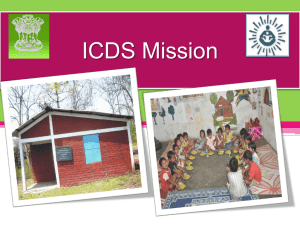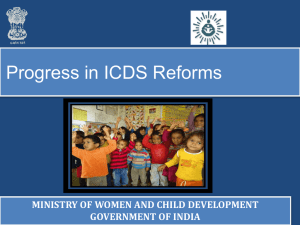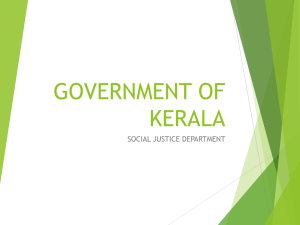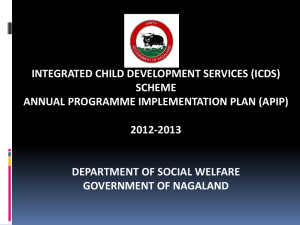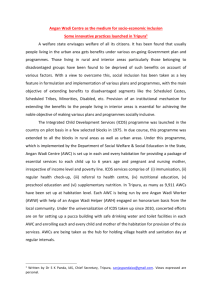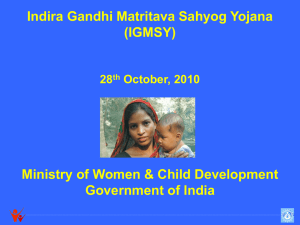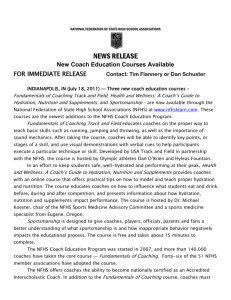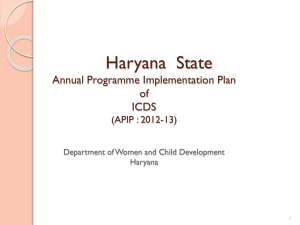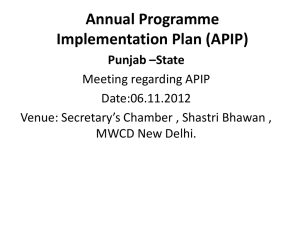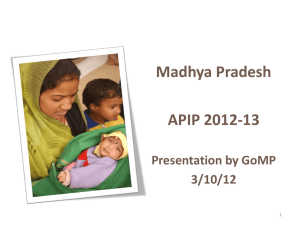Rajasthan - Ministry of Women and Child Development
advertisement
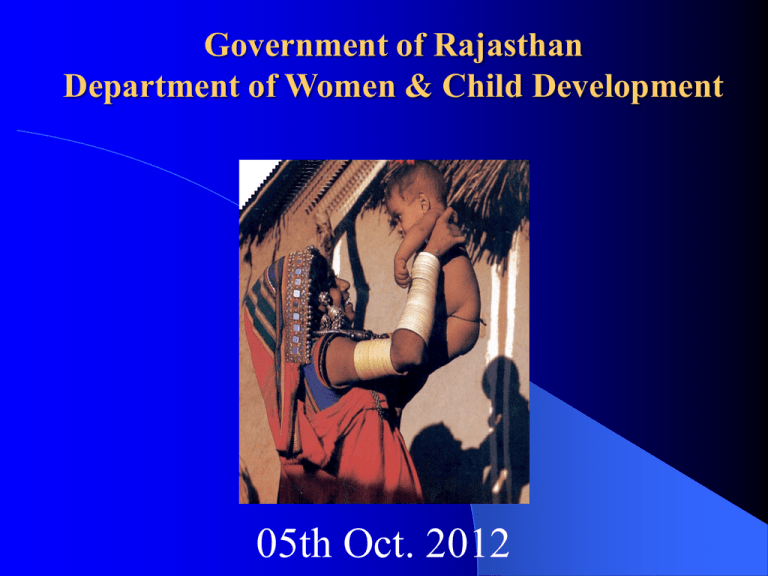
Government of Rajasthan Department of Women & Child Development 05th Oct. 2012 Vision Establishing integrated delivery of services in a responsive, proactive, sustainable and continuous manner through convergent efforts, shared leadership and common accountability. We aim in making AWCs first point of contact for all kind of delivery of services related to PreSchool Education, Health and Nutrition & Empowerment of Women Situational Analysis Indicators Maternal Mortality Ratio (MMR) Infant Mortality Rate (IMR) Status (Rajasthan) (2001)/ 2001-03 Current Status (Rajasthan) 445* 318* 67* 55*** Institutional Deliveries (ID) (%) 32%# 70.4% Anemia among Women 48.5% ## 53.1% # Anemia among Children Underweight children(1-5 years) Complete immunization coverage Female Literacy rate 82.3% ## ◊ 79.6% 51%## 36.8% # 26.5% # 53.8% ◊ 44.34% @ 52.66%@@ Mean Age at marriage 19.7 (AHS) Source: **SRS-2009, *SRS2007, ## NFHSII, #NFHS-III (2005), $ DLHS-III (07-08), Census2001@, ***SRS 2010 , Census2011@@ , ◊ Coverage Evaluation Survey UNICEF, SRS special bulletin on MMR 2007-2009 Main Programmes of the Department Child Development ICDS Management of Malnutrition Anganwari Water, Sanitation & Hygiene Programme. Rajasthan State Commission for Protection of Child Rights Women Empowerment Women Development Programme Chief Minister’s 7 Point Programme for Women Empowerment SABLA / Kishori Shakti Yojana Mahila Sahayata Samiti Self-Help Group Programme. Gender Cell Protection Cell Rajasthan State Commission for Women Organogram Minister, WCD State Minister, WCD Secretary, WCD; Commissioner Women Empowerment Programme Director, Regional Resource centre (7) Director, ICDS Dy. Director, WCD (33) Programme Officers WE(33) Protection officers CDPO (304) Lady Supervisor(2246) Precheta (249) Sathin (9177) Anganwari Worker (54915), Helper (54915) & Asha-Sahyogini(54915), Child Development & Rights of Children ICDS – Health & Nutrition – Pre-school Education – Human Resource & Infrastructure Committees under National Nutrition Policy – State Nutrition Council – State Level Inter-departmental Coordination Committee – District Nutrition Council (DNC) State Nutrition Plan of Action. Child Rights - Child Policy - Rajasthan State Commission for Protection of Child Rights - Girl Child Policy Welfare & Empowerment of Women Social Empowerment Economic Empowerment. Protection Gender Mainstreaming. Present Status of ICDS (As on 31st March, 12) Total Projects 304 Total Anganwari Centres 54915 Mini Anganwari Centres 6204 Total No. of SNP Beneficiaries 37.38 lac Total No. of Pre – School Beneficiaries 11.82 lac Impact of the above initiatives Maternal Mortality Ratio Trend in Infant Mortality Rate 86 90 700 Maternal deaths per 1 lac live births Maternal deaths per 1 lac live births 670 600 500 318 400 300 200 100 79 79 80 65 70 55 60 50 40 30 20 10 0 1991 0 NFHS II (1998) 1996 2001 2005 SRS 2007 Any Antenatel Care Child malnutrition 76% 60 50 63 80% 52 50.6 70% 44 40 60% 50% 33.7 30 20 10 49% NFHS - II (1998-99) 40% NFHS - III (2005-06) 20% 30% 10% 0% NFHS II (1998-99) 0 Under-wt. Stunted NFHS III(Key findings2005-06) Source 2007 2009 Impact contd. Complete Immunization 53.8 60 50 Any Antenatel Care 40 24.5 % 30 26.5 76% 80% 10.1% 70% 20 60% 10 49% 50% 0 NFHS II (1998-99) ICDS Baseline survey(2000) NFHSIII (Key Coverage findings 2005- analysis survey 06) UNICEF 40% 30% 20% Institutional Deliveries 10% 0% 80% 70.40% 70% 60% NFHS III(Key findings2005-06) Source 50% 32% 40% 30% NFHS II (1998-99) 21% 17% 20% 10% 0% NFHS II (1998ICDS NFHS III 99) Baseline (2005-06) survey(2000) Source Coverage Evaluation Survey UNICEF Functional Convergence PHED •Drinking Water Supply •Water Quality • Surveillance and Monitoring • Vitamin A •MTC •ANC •IDD •IFA Supplementation •NHED •Counseling •Linkages with SSA • KGBV • PSE involvement • by AWW DWCD • AWC near Jails/Orphanages/con struction/refugee sites •IEC •Monitoring •Coordination • Community Mobilization •Sanitation Development Partners Major Gaps • Due to lack of awareness there is demand deficit. Inflation makes SNP production financially unviable. Mismatch of decentralization with micro nutrient fortification and local production requirement with sanitation and mechanized production. Lack of awareness and community participation in growth monitoring Malnutrition still not visualized as a fatal disease hampering growth & development. Education levels of AWWs. Movement of children to private schools. In urban AWCs lack of sufficient place for conducting PSE. Low rental and shortage of maintenance funds. Interventions • • • • • • State Nutrition Plan of Action is being developed. SNP Quality control is being done at the State, District and Project level. Focused IEC campaign for awareness generation among the community Sensitization of PRI members for community based monitoring. Cluster/ federation models are being tried out to meet out to overcome the existing problems in decentralised process of procurement of SNP. Growth monitoring in a campaign mode. Financial Profile Name of Scheme Year CSS Provision State Provision Total Provision Addl. Financial contribution ICDS (Gen.) 2012-13 41196.58 4577.40 45773.98 - SNP 2012-13 26081.38 41962.95 68044.33 15881.57 Sabla 2012-13 4641.41 7296.37 11937.78 2654.96 ----- 3041.65 3041.65 3041.65 71919.37 56878.37 128797.74 21578.18 Addl. Hono. To 2012-13 AWW/AWH Total Initiatives of the State. Initiatives Implication (In Lac.) Sahayogini honorarium 4861.04 Sathin honorarium 1488.59 Insurance and Saving Scheme for 148.75 AWW/AWH and Sahayogini Pre School Education Teacher 366.00 Maintenace of AWC’s 500.00 Constrution of AWC building 1867.36 Total 9231.74 Staff Position Name of the post Sanctioned In position vacant Dy. Director 33 15 18 DOP has been requested to post RAS. Promotion process is under progress. CDPOs/ ACDPOs 304 231 73 Selection by RPSC is under progress./ Promotion process under progress. 1689 508 Lady supervisor (175+129) 2197 Remarks Process of filling up posts is under progress. 12th Plan Perspective Capacity building of local Self Govt. to make nutrition a priority agenda . Design and piloting of innovative multi-sectoral convergence models for synergistic action including community based care for underweight children. Community mobilization and action, through panchyat led models and partnerships with women’s SHGs, mothers committees and CBOs. Focus on preventive measures of malnutrition through educating and creating awareness. Using child growth as a driver of change. Affirmative action for the Girl Child. Ensuring continuum of care. Addressing child rights. Support expected from GoI (2012-13) Budget of Rs.385 crore (@3.5 lac per AWC) for construction of 11000AWC buildings. Following is proposed:– 90% cost to be shared by GoI. – Provision of construction of AWC building under NREGEA . – Dovetailing with BRGF scheme for construction of AWCs. Present rate of raw material of SNP is about 30% more than the prevailing norms of GoI. The additional burden has to be born by the State. This may be shared by GoI by 50% .Norms may be revised keeping in view changing consumer index. Additional human resource at the State level to strengthen the monitoring mechanism. Additional worker for conducting Pre-school education. Mobile AWCs for hard to reach and scattered area. Eradication of malnutrition in a mission mode. Upscaling SABLA and IGMSY. Special programme for out of school 6-11 years girls. Pre school be also under the ambit of RTE with provisioning to ICDS for strengthening it.
